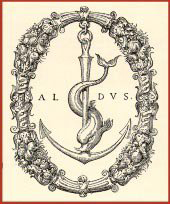tell me what is greener
“And tell me what is greener
Than the grass on yonder hill
And tell me what it crueller
Than a wicked woman’s will. . . .
I know a deadly poison, greener
Than the grass on yonder hill;
And a foul fiend is crueller
Than a wicked woman’s will.”
—Riddles Wisely Expounded, published in Maine in 1937, The Viking Book of Folk Ballads of the English-Speaking World, edited by Albert B. Friedman, 1956.
red blude to the knee
“For forty days and forty nights
He wade thro red blude to the knee,
And he saw neither sun nor moon,
But heard the roaring of the sea.”
—Thomas Rymer, published in Scotland in 1806, The Viking Book of Folk Ballads of the English-Speaking World, edited by Albert B. Friedman, 1956.
Festina Lente
 “Between 1500 and 1533, the great humanist Erasmus compiled his Adagia, a collection of some 4,251 classical proverbs and commonplaces with a rich scholarly commentary—a truly astonishing achievement. One of his most well-known adages was ‘Festina Lente’ or hasten slowly. Aldus adopted it for a slogan, its visual counterpart being an emblem of dolphin and anchor, which he used as a printer’s mark. Erasmus suggests a possible origin for the expression in a witty inversion of the Greek σπεύδε ταχέως, ‘hasten hastily’, found in Aristophanes’ The Knights. It is most famous as the official motto of the Roman emperors Augustus and Titus; Erasmus thus dubs it the ‘royal proverb’, and remarks that it advocates ‘a wise promptness together with moderation, tempered with both vigilance and gentleness, so that nothing is done rashly and then regretted, and nothing useful to the common weal omitted out of carelessness’. It represents, in short, the reining of passion by reason, Plato’s ideal of statecraft—it is the paragon of proverbs.”
“Between 1500 and 1533, the great humanist Erasmus compiled his Adagia, a collection of some 4,251 classical proverbs and commonplaces with a rich scholarly commentary—a truly astonishing achievement. One of his most well-known adages was ‘Festina Lente’ or hasten slowly. Aldus adopted it for a slogan, its visual counterpart being an emblem of dolphin and anchor, which he used as a printer’s mark. Erasmus suggests a possible origin for the expression in a witty inversion of the Greek σπεύδε ταχέως, ‘hasten hastily’, found in Aristophanes’ The Knights. It is most famous as the official motto of the Roman emperors Augustus and Titus; Erasmus thus dubs it the ‘royal proverb’, and remarks that it advocates ‘a wise promptness together with moderation, tempered with both vigilance and gentleness, so that nothing is done rashly and then regretted, and nothing useful to the common weal omitted out of carelessness’. It represents, in short, the reining of passion by reason, Plato’s ideal of statecraft—it is the paragon of proverbs.”
—Conrad H. Roth, from the post Festina Lente at his blog Varieties of Unreligious Experience.